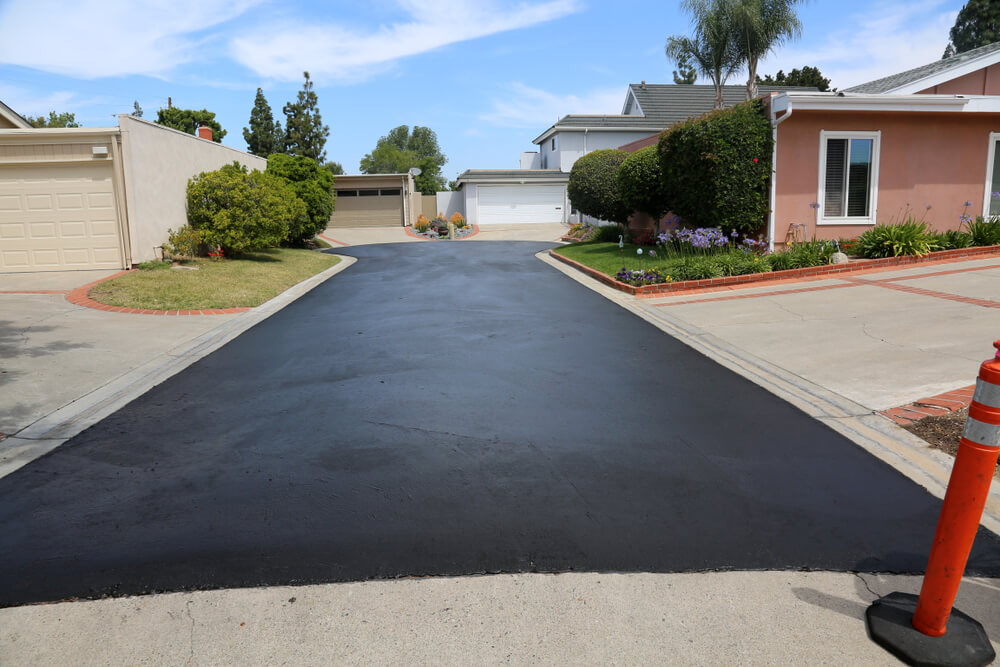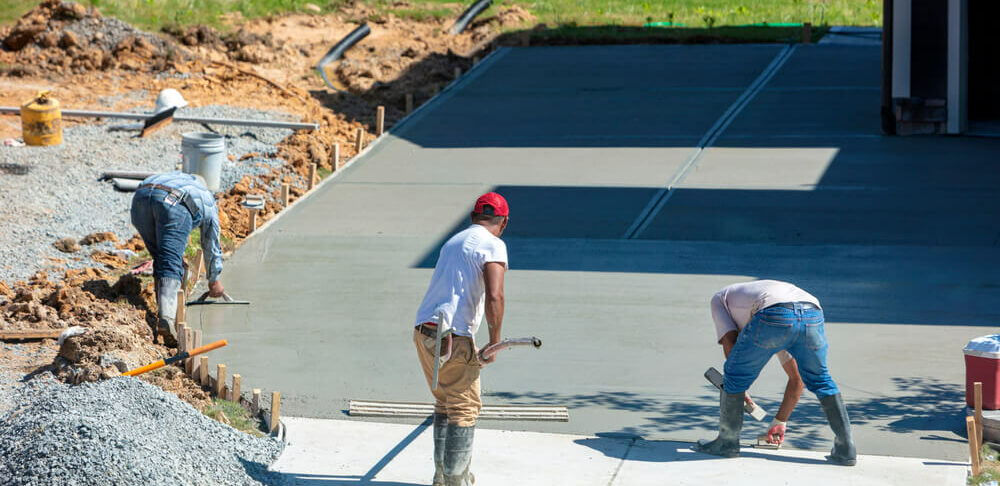Commercial parking lots, more so than residential driveways, must withstand high traffic volumes and heavy vehicles. Over time, parking lot paint fades, cracks appear, and potholes form. When damage occurs, it is essential to schedule updated commercial property paving services.
Perhaps you are building a brand new school, retail center, office park, or other commercial space, and you’re unsure of which paving option is best suited for your building. Concrete and asphalt are both popular options for new commercial installations and parking lot repairs.
But which pavement option is best for your commercial property? Let’s take a look at the pros and cons of concrete and asphalt paving, so you can make an informed decision about what’s best for your commercial property.
Concrete Commercial Property Paving
Concrete paving has been a tried-and-true choice for many commercial property owners over the years. Concrete pavement offers many benefits, as well as some drawbacks.
Concrete Pros
The main benefits of concrete paving are:
- Long life span
- Low maintenance
- Ideal for hot climates
- Customizable
With the proper care, concrete commercial parking lots can last between 20 and 40 years. Concrete is incredibly durable, which allows for impressive longevity. In some cases, with ideal conditions and excellent upkeep, concrete can even last beyond 40 years.
Many people are attracted to concrete because it is low maintenance. As long as you maintain basic upkeep and schedule repairs as soon as you notice damage, concrete remains relatively simple to preserve.
Concrete commercial parking lots are best suited for hot weather. Since concrete is a lighter color than asphalt, it results in cooler temperatures during hot months. It is unlikely for a concrete surface to morph due to hot weather.
Concrete can be customized with different paving finishes such as a smooth troweled finish, broom finish, and exposed aggregate finish. In addition to parking lots, concrete is also an ideal surface for other paved commercial structures such as sidewalks, patios, and garage floors.
Concrete Cons
Even though there are many benefits of concrete paving, there are also some disadvantages. Some of the cons of concrete paving are:
- Salt damage
- Frost heaves
- Installation costs and time
- Water runoff regulation
In cold winter climates, commercial concrete parking lots are susceptible to salt damage and frost heaves. Frost heaves create uneven surfaces and require prompt maintenance, and the salt used to melt ice and snow can cause permanent damage to concrete.
Even though concrete is typically low maintenance, it is more expensive than asphalt to install, and it can take up to seven days to properly cure before you can use it.
Concrete is not a permeable material, so water tends to collect during and after heavy rainfalls. Your commercial business will need to create a water runoff management plan to avoid large amounts of standing water.

Asphalt Commercial Property Paving
Now that we’ve considered the pros and cons of commercial concrete paving, let’s explore the benefits and drawbacks of asphalt paving.
Asphalt Pros
You’ve likely seen many commercial properties with asphalt parking lots in your area. Asphalt paving offers many benefits, including:
- Affordability
- Quick installation
- Simple repairs
- Ideal for cold climates
Asphalt is less expensive to install than concrete. Additionally, asphalt materials are readily available, so commercial parking lot projects can be completed quickly. Asphalt parking lots can be ready to use in as little as two days.
Asphalt requires a little more regular maintenance than concrete paving, but repairs are inexpensive and straightforward to complete. And unlike concrete, asphalt is rarely affected by freezing temperatures. Winter salt use does not cause asphalt to morph or deteriorate.
Asphalt Cons
Just like with concrete, asphalt paving has disadvantages depending on your climate and usage. Some cons of asphalt commercial paving are:
- Permeable surface
- Affected by heat
- Short lifespan
While asphalt’s permeable surface helps with water runoff, it can be susceptible to damage from heavy machinery like snowplows. Because of its softer surface, asphalt parking lots can be negatively affected by extreme heat. Asphalt surfaces can shrink, expand, or produce an oil sheen when influenced by hot temperatures.
Compared to concrete, asphalt has a shorter lifespan. However, its longevity is still impressive. On average, asphalt can last anywhere between 15 and 30 years before it needs to be replaced.
Things to Consider Before a Commercial Paving Project
Before beginning a commercial paving project, there are certain things you should consider about your property and region. If you’re unsure about materials, upkeep, or project time, you should ask your paving company questions before committing to beginning a project.
Contemplate the following considerations before deciding between concrete and asphalt:
Affordability
Commercial property budgeting is essential for property owners. If you have a parking lot on your property, be sure to budget for preventive maintenance and preserving curb appeal. When you budget for regular maintenance, commercial asphalt paving is an economical choice.
Climate
As you can tell from the pros and cons comparisons above, seasonal weather affects asphalt and concrete differently. If your region normally experiences hot temperatures, concrete is a good choice. On the other hand, asphalt is a wise selection if you live in an area with frequent cold temperatures.
Environmental Sustainability
If environmental sustainability is an important consideration for you, you might strongly consider commercial asphalt paving. Asphalt is environmentally friendly because it is made out of recycled materials and requires less energy to install.
Choose a Strong Foundation for Your Commercial Property
As you can tell, concrete and asphalt both offer many benefits for commercial parking lots. Depending on your regional climate, budget, and personal preferences, either material can be a sound choice for commercial property paving. When you weigh all of the proper considerations, your new parking lot should last many years.
Richfield Blacktop has laid over 8.5 million square feet of asphalt and concrete paving in Minnesota. We often suggest that commercial properties in Minnesota and the greater Midwest choose asphalt paving because of its sustainable qualities and ability to withstand cold temperatures.
If you have any more questions about concrete or asphalt commercial paving, reach out to us at Richfield Blacktop. If you know what paving material you want and are ready to begin your project, request a free quote today!




